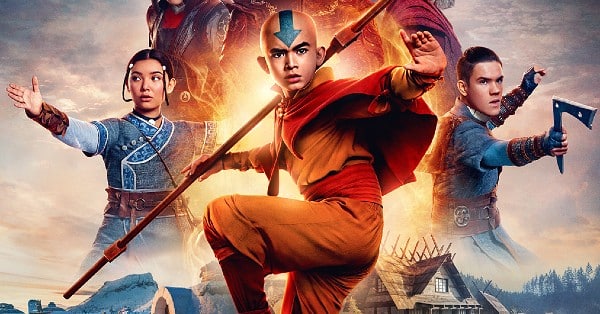Netflix’s by live-action adaptation of Avatar: The Last Airbender, one of the most acclaimed andt beloved guy animated shows of all time, has turned out to be a disaster of epic proportions. The series, which debuted on February 21, 2024, is a travesty that insults the fans, the creators, and the cultures that inspired the original show. The series fails to deliver on every aspect: the writing, the acting, the directing, the visual effects, the action, the humor, the diversity, and the authenticity. The series is a colossal waste of time and money, and a stain on the legacy of Avatar: The Last Airbender.
The original show, which aired from 2005 to 2008 on Nickelodeon, was a masterpiece of storytelling, animation, and culture. The show followed the adventures of Aang, a young boy who is the reincarnated Avatar, the master of all four elements: air, water, earth, and fire. Along with his friends Katara, Sokka, and Toph, Aang must stop the Fire Nation from conquering the world and end the Hundred Year War. The show was praised for its rich and complex worldbuilding, its compelling and diverse characters, its balance of drama, action, and comedy, its stunning animation and choreography, and its respect and appreciation for various Asian and Indigenous cultures.
The Netflix series, however, is a pale and pathetic imitation of the original show, which loses all of its essence, spirit, and quality. The series suffers from numerous problems, such as:
- Whitewashing: The original show featured a cast of characters that were inspired by and represented various Asian and Indigenous cultures, such as the Inuit, Tibetan, Chinese, Japanese, and Korean. The Netflix series, however, cast mostly white actors for the main roles, erasing the representation and authenticity of the source material. For example, Aang is played by Finn Wolfhard, a Canadian actor of French, German, and Jewish descent, while Katara and Sokka are played by Millie Bobby Brown and Noah Schnapp, both British actors of white ethnicity. The only exception is Zuko, the conflicted prince of the Fire Nation, who is played by Remy Hii, an Australian actor of Chinese and Malaysian descent. Many fans and critics have accused Netflix of whitewashing the characters and disrespecting the original creators and cultures.
- Lack of humor and charm: The original show was praised for its balance of drama, action, and comedy, as well as its memorable and lovable characters. The Netflix series, however, lacks the humor and charm that made the original show so enjoyable and relatable. The characters are bland, boring, and unlikable, and the dialogue is stiff, awkward, and unnatural. The series also fails to capture the emotional depth and complexity of the characters, such as Aang’s struggle with his destiny, Katara’s trauma and resilience, Sokka’s growth and leadership, Toph’s independence and disability, and Zuko’s redemption and honor. The Netflix series reduces the characters to stereotypes and caricatures, and misses the opportunity to explore their motivations, relationships, and arcs.
- Poor visual effects and action: The original show was renowned for its stunning animation and choreography, which were based on real martial arts styles and movements. The Netflix series, however, has poor visual effects and action scenes, which are dull, slow, and unconvincing. The series fails to showcase the beauty and power of the four elements, as well as the creativity and skill of the benders. The series also ignores the rules and logic of the bending world, such as the need for a source of water, earth, or fire, or the influence of the moon and the sun. The Netflix series makes the bending look like a cheap and easy trick, rather than a complex and sacred art.
- Lack of diversity and cultural sensitivity: The original show was praised for its respect and appreciation for various Asian and Indigenous cultures, which influenced the design, history, and philosophy of the world and the characters. The Netflix series, however, lacks the diversity and cultural sensitivity that made the original show so authentic and meaningful. The series fails to incorporate the cultural elements and references that enriched the original show, such as the Chinese characters, the Buddhist and Taoist concepts, the Hindu and Tibetan mythology, the Japanese anime and manga, and the Native American and Inuit traditions. The Netflix series also fails to address the themes and issues that the original show tackled, such as colonialism, genocide, oppression, spirituality, identity, and balance. The Netflix series strips away the cultural depth and significance of the original show, and instead delivers a generic and superficial version that does not respect or understand the cultures that inspired it.
In conclusion, Netflix’s Avatar: The Last Airbender is a disaster of epic proportions, which fails to capture the magic, humor, and heart of the original show, which was a masterpiece of storytelling, animation, and culture. The series fails to deliver on every aspect: the writing, the acting, the directing, the visual effects, the action, the humor, the diversity, and the authenticity. The series is a colossal waste of time and money, and a stain on the legacy of Avatar: The Last Airbender. The series is a disgrace to the fans, the creators, and the cultures that inspired the original show, and should be avoided at all costs.
